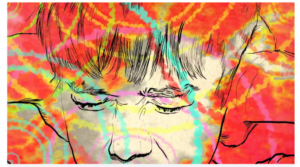Contrary to the misconception that autistic individuals are not able to have successful romantic relationships, many individuals with ASD are in long-term relationships. However, there are several difficulties autistic people face when having and sustaining these relationships. Psychologist Kirsty Kerr addresses some of these difficulties in her article “Romantic Relationships and Autism Spectrum Disorder.” These include sensory difficulties, understanding appropriate behaviors, managing anxiety, rigidity, understanding others’ intentions in order to not misinterpret friendliness, and understanding others’ reactions to their behavior. For the purpose of this blog, we will focus on the difficulties autistic individuals face with sensory overload.
Let’s take a closer look at this topic. Alex, an autistic individual, is on a date at a local nightclub with Jamie. As soon as they walk in, the smell of alcohol, cigarettes, and strong cologne meet them. Strobe lights light up the dance floor, changing colors and intensity rapidly. They continue to walk to a table at the other end of the room and are bumped against and jostled as they try to maneuver through the crowd. Alex is unable to block out all of the noises, lights, and smells and rushes out of the building.
As you can see from this example, sensory overload occurs when one or more senses experience over stimulation from the environment. For example, Alex has difficulty responding to the intense lights and overwhelming smells. This can lead to stress, anxiety, withdrawal, challenging behavior, or meltdowns.
In the article “Dating on the Autism Spectrum,” Emily Shire addresses the topic of sensory difficulties in greater detail.
 While a neurotypical person might think a nightclub is a great place for a date, an autistic person might disagree. Dorsey Massey, a social worker who helps run dating and social programs for adults with intellectual disabilities, explains that loud and crowded spaces may make an autistic person uncomfortable. The lights, noise, smells and other visual stimulation can be unpleasant. Touching, kissing, and holding hands can also give autistic individuals discomfort. These displays of affection are usually light touches and autistic people need pressure.
While a neurotypical person might think a nightclub is a great place for a date, an autistic person might disagree. Dorsey Massey, a social worker who helps run dating and social programs for adults with intellectual disabilities, explains that loud and crowded spaces may make an autistic person uncomfortable. The lights, noise, smells and other visual stimulation can be unpleasant. Touching, kissing, and holding hands can also give autistic individuals discomfort. These displays of affection are usually light touches and autistic people need pressure.
Despite these difficulties, there are ways to help alleviate some of these struggles and make dating a positive

Dave Hamrick and his wife Lindsey Nebeker who are both on the autism spectrum and are part of the “Autism in Love” documentary.
experience for both parties. Even if it is a bit more challenging, autistic people deserve to be loved and desire companionship just as much as neurotypical people.
Speak Your Mind